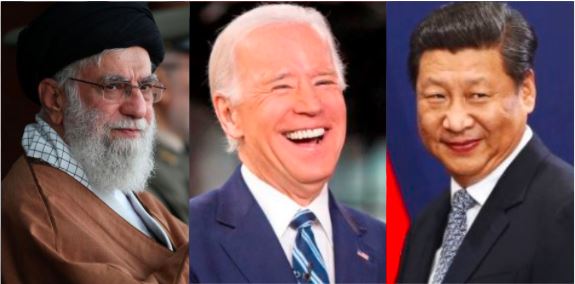US President Joe Biden has surrendered meekly before the wannabe nuclear power Iran. Tehran is literally blackmailing the Oval Office into rolling back sanctions, while also refusing to comply with nuclear obligations. But why is the President of the United States acting weak in face of Iran’s stubbornness? Is it just a legacy issue or is there something else that doesn’t meet the eye? Well, as shocking as it may sound, a China connection is visible behind Biden’s Iran policy. In fact, Beijing seems to be scripting and directing Biden’s disastrous Iran policy.
On Tuesday, China’s representatives in talks with Iran asked the United States of America to lift its sanctions against Iran. Ambassador Wang Qun, the Chinese Permanent Representative to the United Nations and other international organisations in Vienna, even claimed that the current deadlock was created by the American decision to withdraw from the Joint Comprehensive Plan of Action (JCPOA) or the Iran nuclear deal, and impose sanctions on Tehran.
Did you notice something? Beijing did not issue a warning in undiplomatic/ brash language, which is otherwise a basic trait of Chinese diplomacy. Rather, the Chinese representatives gave sincere advice to the Biden administration and that too with the clear belief that their suggestions would be acted upon.
There is a clear sense of belief in China and its diplomats that the Biden administration would act in accordance with their advice. Why China gets that kind of confidence from the Biden administration is something that only Beijing and the US President can elucidate.
Yet, we do notice how Biden seems to have been following China’s line in his Iran policy thus far. Last month, even the Chinese Foreign Minister Wang Yi visited the Shi’ite nation, and then Global Times, the mouthpiece of the Chinese Communist Party (CCP) reported, “Wang Yi visits Iran, outlining China’s peace-broker role.”
So, China has assumed the “peace-broker role” between Tehran and the Biden administration. Beijing would, of course, have not gone out of its way to assuming that role and there must be some tacit understanding which lets it play peace-broker. Even the Biden administration has not expressly denied such suggestions, nor has it refuted that Beijing can play the central role of a “peace-broker”.
Iran too is excited about China’s growing role in its negotiations with the Biden administration. The Shi’ite nation has made it clear that it will pursue its strategic China partnership, but with caution.
For Iran, China partnership is not a pivot towards Beijing, rather it is an attempt to use the Communist nation for improving its relations with the US. As per Iran’s Supreme Leader, there is a conscious effort to ensure that Iran is “neither East nor West, Islamic Republic.”
This is why Iran has been trying to warm up to both the giants even at its own level. On one hand, Tehran is working on its strategic partnership with Beijing that involves billions of dollars of Chinese investments. On the other hand, Iran is also pressuring Biden to roll back the sanctions imposed on it by the Trump administration.
Such recent developments suggest that a nexus is building up between the US, China and Iran. The Biden administration is letting Iran blackmail it, while Iran and China warm up to each other. Yet, the most important development has been Beijing’s attempts to assume a central role in the ongoing negotiations between Washington and Tehran.
In this context, China has also started directing Biden’s Iran policy, which is going to be disastrous for the United States of America.








